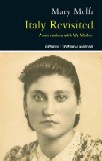
Italy Revisited: Conversations With My Mother
Mary Melfi
Guernica Editions
$25.00
paper
326pp
978-1-550712865
Mary Melfi and her family arrived in Canada as part of the wave of immigrants fleeing Europe after WWII. Left behind was the land (la patria), grinding poverty (la miseria), relatives – and family history, which children of immigrants, like Melfi, often push aside. But when an elderly aunt dies, Melfi decides there’s no time to lose in capturing the past. It is no coincidence that Melfi begins resurrecting her family’s history on Palm Sunday and, 71 conversation-like chapters later, ends it on Easter Monday.
Having grown up in Montreal as someone who fit into neither “founding culture,” Melfi knows of the disconnect between generations and conveys it very well. For Melfi, as for many immigrant children, language and knowledge of the prevailing culture become weapons to beat off Old World ways. Acting as translators, children obtain a measure of power over their elders.
But the author has an agenda and, in a courtroom, Melfi’s questions to her mother would be called leading. Sometimes, the voices of mother and daughter even become indistinguishable. As though unable to shrug off the role of translator, Melfi labours to give her mother’s stories contemporary meaning by filtering them through the modern lens of feminism and a new-found pride in la patria. She clings to romantic notions about a way of life lost but for the stories she pries out of her mother. Unfortunately, Melfi’s unwillingness to accept the realities of la miseria is too often an intrusion.
Melfi’s mother is alert to her daughter’s efforts and resists exploring her memories, especially when preparing dishes her daughter never had the patience to learn how to cook. “You’re looking for beautiful memories but I just have sad ones,” she says.
Without common terms of reference, Melfi’s ability to translate grows harder. To compensate, Melfi – a poet and writer of fiction and children’s stories – peppers the book with statistics, historical information, and personal observations. These take the reader away from the central relationship and the compelling flow of Melfi’s lyrical style. Chapters reveal village mores, superstitions, the barter system, all the harshness of rural life lived in a stone cottage with no amenities and, always, the food that sustained daily life and marked feast days. Melfi even tosses in a few recipes for good measure. These sections are short and readable, when Melfi is not adding her own spin on every tale.
The book’s main strength and main weakness both lie in its tension of viewpoints. In Italy Revisited, the clash of wills between daughter and mother limns the contrast between them as well as the pervasive regret on both sides over lost opportunities. It also poignantly illustrates why, as modern women, immigrant daughters have an additional handicap in understanding their mothers. “Am I writing non-fiction or fiction here?” Melfi asks. For the reader, her mother’s life ultimately holds more fascination than Melfi’s take on it. mRb






Ciao,
I intend to purchase this book, as it a sort of an anthropological expose’. Or even a kind of microhistory. It is an important work, for sure, even by its mere existence.
I commend the author for her foresight in understanding the importance of preserving our past, especially the oral history.
I was just wondering about the manner in which she sees herself: “an immigrant’s daughter.”
Maybe I’m missing something, yet, is she not an immigrant herself, having come to Canada at a young age?
I see myself as the son of immigrants, because I was born in Canada.
I don’t really place much importance on where you’re born. I say this because she and I are both beholden to a past and a culture that is neither British nor French. This is a point of pride, indeed, for the both of us, I imagine.
I have even gone so far as reclaiming my Italian citizenship. Alongside my Sicilian language, I continue to make a conscious effort to cultivate the Italian language, which i resolved to learn during my university years.
As my dear friend and belated friend, Franco DeSantis (1932-2019), would say: “La lingua italiana e’ come una donna: vuol essere cortiggiata.”
Just curious….
Grazie mille.
Can I buy your book on line?
You can buy it online via the publisher, Guernica Editions, at this link: https://guernicaeditions.com/products/italy-revisited?_pos=1&_sid=737abb22d&_ss=r
my mothers uncle^dominic vincelli is in one of your photos from st paul minn. my aunt wondered where it cama from.
Hi, thank you for writing! We suggest you get in touch with the author via this link: http://www.italyrevisited.org/contactus
Hope this is helpful!
Hi – I came to Australia with my mum & sister in 1959 as a 9 year old. My father had arrived in Australia 7 years earlier in 1952.
In conversations with mum & dad in the years after I had attained the age of 25 (when I married an Italian immigrant lady) I was constantly told by both of them that life had been good and that thete was no such thing as “miseria”” in Italy. I then asked dad why he emigrated to Australia and 7 years later he arranged for us to come out also, he would simply say that he did what other Southern Italians were doing – but still painting a rosy picture of Italy when he lived there. I would tell both mum& dad that through what I had studied, I knew that “museria” was rife in Itsly after the war and that they had made a good choice in coming out to Australia. But they maintained that things were rosy in Italy
I think they were simply proud to be Italians and thus conveniently ignored the reality of the past.